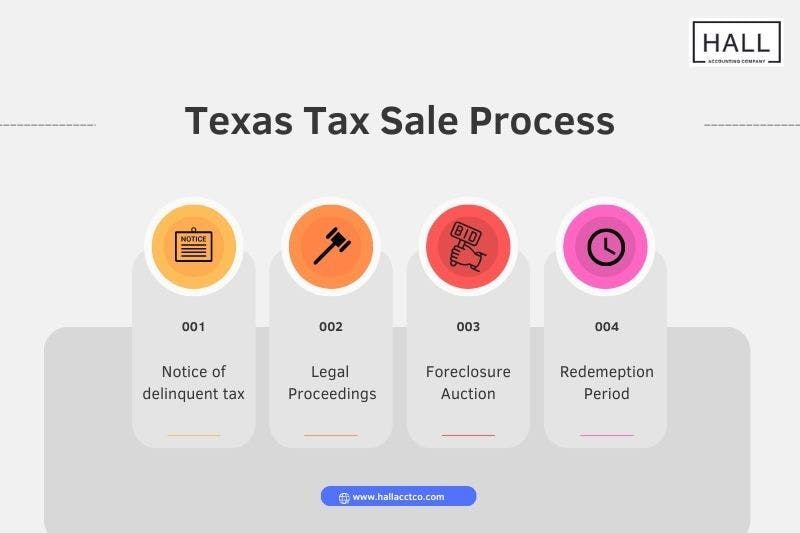
Texas tax liens are legal claims placed on a property by local taxing authorities when property taxes are not paid on time. The Texas Property Tax Code grants counties the authority to impose liens on properties with delinquent taxes, which secures their right to collect.
In this article, we aim to cover three main topics that interest individuals dealing with tax liens:
A legal definition of tax liens and the process involved in attaching your property to a lien
What you can do to redeem your property
The rights of investors and property owners when it comes to purchasing a property with a tax lien
Understanding tax liens in Texas
A tax lien is a legal claim placed on a property by a government authority, usually due to unpaid taxes. When the property owners fail to meet their tax obligations, the government secures its ability to collect through this lien, which attaches to the property.
Unlike some states, Texas does not sell tax lien certificates, but rather conducts tax sales that can lead to the transfer of the real property through a foreclosure process.
When is a tax lien due?
In Texas, a tax lien is attached to a property as of January 1 each year, even if the taxes aren’t immediately due. This type of lien is sometimes referred to as a ‘super lien’, as it takes precedence over other claims, such as mortgages.
________________________________________________________________
If you’re dealing with a Texas tax lien, don’t wait to get help. The first step is to stop your home from going to foreclosure. Hall Accounting Company’s senior tax associates are ready to assist you by reviewing your finances and helping you make repayment arrangements on your outstanding property taxes.
________________________________________________________________
The process of tax liens in Texas

When property taxes remain unpaid, the county tax authorities initiate a process that can lead to a tax sale or judicial foreclosure. Here is how this process unfolds:
Notice of delinquent tax
Property owners will receive a notice from their local tax authority that their taxes are overdue. If no payment is made by the due date, then interest and penalties are added to the amount. Penalties and interest on unpaid taxes start accruing in February of the delinquent year.
You can expect to pay interest of 25% the first year and then another 25% for as long as it extends.
Legal proceedings
After six months, many counties will forward unpaid accounts to collections. If still unpaid, legal actions such as foreclosure proceedings are initiated.
Filing for bankruptcy can impact the tax lien process, as an automatic stay may temporarily stop the process. However, property tax liens usually survive this process, meaning they will still need to be dealt with post-bankruptcy.
Foreclosure auction
Properties with delinquent tax liens are offered at a public auction, typically on the first Tuesday of every month, which is the set sale date in Texas. Interested buyers must complete a bidder registration form and have the necessary funds (usually certified funds like a cashier’s cheque or money order).
What happens at foreclosure auctions?
The minimum bid on the sale property must be the lesser of:
The aggregate amount of the judgments against the property or
The home's market value. (Tex. Tax Code § 33.50(b).)
If no bid is sufficient to pay the lesser of the judgment or the property's fair market value, then the taxing unit may terminate the sale. Or the property may be bid off to the taxing unit for the lesser of such amounts unless otherwise agreed by other taxing units that are party to the judgment.
In Texas, the county holds the funds of any foreclosure sales until the redemption period is up. It does not sell tax lien certificates to a winning bidder. Delinquent tax attorneys usually handle this process for the taxing unit.
Redemption period
Once the sale of a property is complete, you have a redemption period during which you can repay your taxes and reclaim your property.
The redemption period and associated interest rates vary depending on the type of property. Here’s a quick overview to help you understand what you may owe and how long you have to redeem your property before the lien escalates to foreclosure.
Property Type | Redemption Period | Interest Rate |
Homestead residence and agricultural properties | 2 years | 25% per year |
Non-homestead properties | 6 months | 25% for the first year, then another 25% if not settled by the end of the first year |
All other properties | 6 months | 25% annually |
Statute of limitation on a tax lien in Texas
The statute of limitation on a tax lien in Texas is 20 years from the date the lien is established. After this period, the lien becomes unenforceable.
Property owners can go for several years without paying property taxes while they make payment arrangements, but they run the risk of incurring penalties, interest, and the risk of foreclosure. This makes it financially challenging and unlikely that a tax lien will be extended for 20 years. Texas counties generally take legal action long before then, relying on property tax revenue to fund essential services like schools and public infrastructure.
What happens if you pay someone else’s property taxes in Texas?

Paying someone else’s property taxes in Texas does not give you ownership rights or legal interest in the property. Texas law stipulates that property rights are not transferred simply by covering unpaid taxes. Here’s what to know:
Property transfer is only possible through a formal sale, deed transfer, or foreclosure auction.
If you have a written agreement with the property owner, you may seek repayment of the outstanding debt, but you cannot gain automatic ownership rights to the property.
What can you do to redeem your property?
In recent years, there has been a focus on ensuring property owners have a fair amount of time to redeem their properties, and some counties have adjusted their auction practices to increase transparency. This is good news for property owners; however, there are steps you can take to prevent a tax lien from escalating to foreclosure.
It’s advisable to seek the help of a Dallas-based tax professionals for the following reasons:
Calculating redemption amounts accurately: Tax lien redemption calculations can be complex, particularly when penalties, interest, and any legal fees are added. CPAs ensure that amounts are calculated accurately, avoiding further penalties.
Exploring Payment Options: A CPA can often assist in negotiating with the tax assessor-collector’s office for payment plans or alternative solutions that could prevent the lien from progressing to an auction.
Tax and Estate Planning: Since property tax liens can impact estate planning, especially for heirs, a CPA can help mitigate future risk by establishing proactive strategies to address or avoid liens on inherited properties.
________________________________________________________________
Our senior tax associates are experienced in helping homeowners navigate redemption options, negotiate payment plans, and find relief through exemptions.
________________________________________________________________
While working with a tax professional is often the best course to ensure accurate redemption calculations and explore flexible payment solutions, you may decide to handle the redemption process independently. If you choose to manage this yourself, following a systematic approach can help you stay organized and increase your chances of success. Here’s a step-by-step guide to redeeming your property
Step-by-step guide to redeem your property

Redeeming your property from a tax lien can be complex, but timely action and accurate calculations are critical to avoid foreclosure. Here’s a structured approach to reclaiming ownership:
Get a complete picture of your financial situation
Begin by thoroughly assessing your finances. There are probably some really good reasons for having outstanding property taxes. You’ll need to work through those reasons before tackling outstanding taxes, penalties, interest, and additional fees. Identify any assets or additional income streams that can be used to initiate repayments.
Evaluate redemption options
Calculate the exact deadline of the redemption period for your specific property so that you know how much time you have to work with. Remember that you will pay 25% interest for every year that your property taxes are outstanding, so you need to take this into consideration.
Prioritize a repayment plan
To prevent your home from going on auction, you must prioritize a repayment plan. If you can raise the funds, the best-case scenario is to settle the tax lien immediately. Many Texas counties are open to structured repayment plans but are strict about your adherence to them. Your willingness to stick to the repayment plan will prevent the county from proceeding with foreclosure.
Investigate relief programs
You may qualify for homestead exemptions, senior exemptions, and disability exemptions that can reduce future tax burdens. Although this may not solve your current situation, it will prevent or decrease your tax obligations going forward.
Seek professional negotiation with local tax authorities
If there are valid legal reasons for you having missed your property taxes, you could negotiate penalties with the local tax authority. For example, demonstrating financial hardship may open the door to temporary payment reductions or penalty appeals.
Ensure future tax compliance and financial planning
You should set up annual payment reminders and a designated savings plan to prevent future property tax liens. You can also consider a tax escrow amount through your mortgage lender (if available), which can assist you in paying your property taxes on a monthly basis.
Helpful resources
For property owners facing tax liens, these resources can provide crucial support and guidance:
Local County Tax Offices: Each Texas county has its own regulations, and their tax office websites offer specific information on local rules, deadlines, and auction procedures. Contacting your county tax office directly is often the best first step in understanding your options.
The National Tax Lien Association: The NTLA is a resource for educational materials and legislative updates on tax lien processes across the country. Their online guides and webinars can help you understand the intricacies of Texas tax liens and how to navigate them effectively.
Legal Aid Services: Several nonprofit legal aid organizations offer free or low-cost assistance to primary homeowners facing tax liens. Legal aid can be particularly helpful in cases where financial hardship or a misunderstanding of the law contributed to missed tax payments.
Consulting with a CPA or Tax Professional: Working with a Certified Public Accountant (CPA) or a tax advisor can ensure that redemption amounts are calculated accurately and that available exemptions or deferral options are maximized. A CPA can also assist in long-term tax planning to prevent future liens.
By using these resources, you can better manage your tax lien situation, make informed decisions about repayment or redemption, and reduce the risk of foreclosure.
Conclusion
Navigating a Texas tax lien can feel complex and overwhelming, but with the right resources and support, you can prevent it from escalating into foreclosure. Understanding your rights, taking proactive steps to avoid additional penalties, and strategically planning are essential for protecting your home and your financial future.
For many homeowners, partnering with an experienced CPA firm, like Hall Accounting Company, brings peace of mind. A tax professional can streamline the redemption process, accurately handle calculations, and explore available exemptions or payment solutions on your behalf. By making informed choices and seeking support as needed, you can successfully reclaim ownership and safeguard your property.